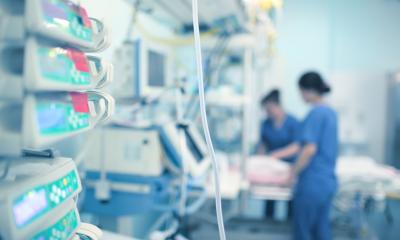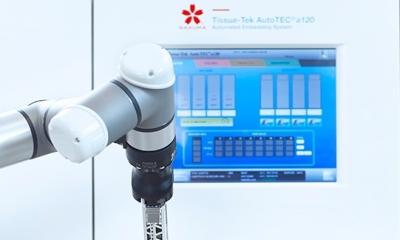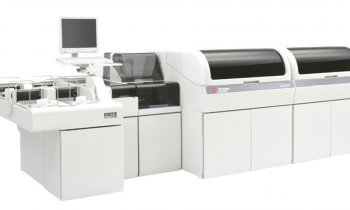Article • Harmonising practices
IFCC structure heralds a new era for lab medicine
A new drive to increase the clinical effectiveness of laboratory medicine and take the discipline into a new era is being launched.
Report: Mark Nicholls

Coupled with steps to harmonise laboratory medicine services across Europe, a move to make lab medicine more clinically effective is being spearheaded by the International Federation of Clinical Chemistry and Laboratory Medicine (IFCC). The latest position were outlined at the EuroMedLab 2017 congress, booked for 11-15 June at the Megaron Athens International Conference Centre.
Former IFCC President Dr Graham Beastall delivered a presentation looking at ‘a proposed structure for defining, undertaking and reporting studies to assess the clinical effectiveness of laboratory medicine’. Presentations from other speakers aim to define and demonstrate clinical effectiveness in this field. ‘Laboratory medicine results influence a high percentage of all clinical decisions,’ Beastall confirmed during our interview. However, this impact is diluted by variability in the services provided, the results obtained and the way in which those results are used.
Improving clinical effectiveness is not enough
Improving the clinical effectiveness of laboratory medicine relies on the optimal delivery of the right test, to the right patient at the right time
Graham Beastall
‘Consequently,’ he pointed out, ‘there is a global programme to harmonise the practice and delivery of laboratory medicine for the benefit of the patient.’ While the harmonisation programme has several dimensions - many of which are targeted at reducing the variability in results provided by different laboratories – Beastall maintains that this focus on improving analytical quality is not, by itself, sufficient to bring maximum benefit to patients. ‘Improving the clinical effectiveness of laboratory medicine relies on the optimal delivery of the right test, to the right patient at the right time, coupled with a consistent interpretation of the results obtained, which are then translated into an evidence-based decision that will lead to the optimal clinical outcome for individual patients.’
He also pointed out that there are currently few clear examples of the link between the result of a laboratory medicine investigation and the optimal clinical outcome for patients. This may be down to various reasons, such as the ‘weight of other clinical and diagnostic information and evidence that the physician has to consider’. To address this, the approach in the new IFCC programme is to start with a single defined clinical outcome and then provide evidence of the impact that laboratory medicine results have in delivering that outcome. Beastall’s presentation aims to define appropriate clinical outcomes and give examples of how laboratory medicine impacts on them.
The IFCC proposed structure is constructed around a standard template for conducting clinical effectiveness studies with five defined stages: identify a specific clinical outcome; determine the impact that laboratory medicine should have on this outcome; gather evidence from the literature, or from a new study, to determine the actual impact of laboratory medicine data; prepare a report in a standard format leading to a recommendation on how to use laboratory medicine investigations to optimise clinical outcome; publish the report in a standard format creating a freely available, growing electronic library of studies linking clinical outcomes to laboratory medicine results.
Beastall suggests that a growing e-library of clinical effectiveness reports will provide a resource for laboratory medicine specialists to use in collaboration with their local physicians, and over time that will lead to greater harmonisation in the clinical application and use of laboratory medicine results. To generate momentum in the project, an international cohort of laboratory medicine specialists willing to use the structure will need to be recruited, with IFCC co-ordinating studies and providing advice.
Entering a new era
‘There is widespread recognition that laboratory medicine is entering a new era of impact on healthcare,’ Beastall believes. ‘To date, the focus has been on the growing availability of new tools and new technologies to improve the quality and expand the repertoire of investigation, especially at the molecular level. ‘There needs to be a parallel drive to educate users of laboratory medicine services that the way in which new results may be used will be critical to the delivery of improved clinical outcomes.’ Such a move will enable pathologists and laboratory medicine specialists to provide a better service to users and patients. ‘The broader impact of the initiative should be a gradual recognition by physicians, other healthcare professionals and patients of the importance of laboratory medicine,’ he added. However, he stressed that success of the new initiative will depend on others accepting the invitation to embrace the proposed structure, perform clinical effectiveness studies and report them in a standard format.
* The IFCC Symposium: ‘Increasing clinical effectiveness in laboratory medicine’. 13 June. 10.30am-12.30pm Skalkotas Hall, Megaron Athens Centre.
Profile:
Graham Beastall is a former President of the IFCC, having served as President from 2009-2014. Prior to 2009 he was Clinical Lead for a multi-site network Department of Clinical Biochemistry in Glasgow. He has published extensively on biochemical endocrinology and led IFCC projects to demonstrate the value of laboratory medicine in healthcare and to promote the need for increasing clinical effectiveness. Beastall was formerly President of the Association for Clinical Biochemistry (ACB) and Vice President of the Royal College of Pathologists (RCPath) in the United Kingdom.
13.06.2017











